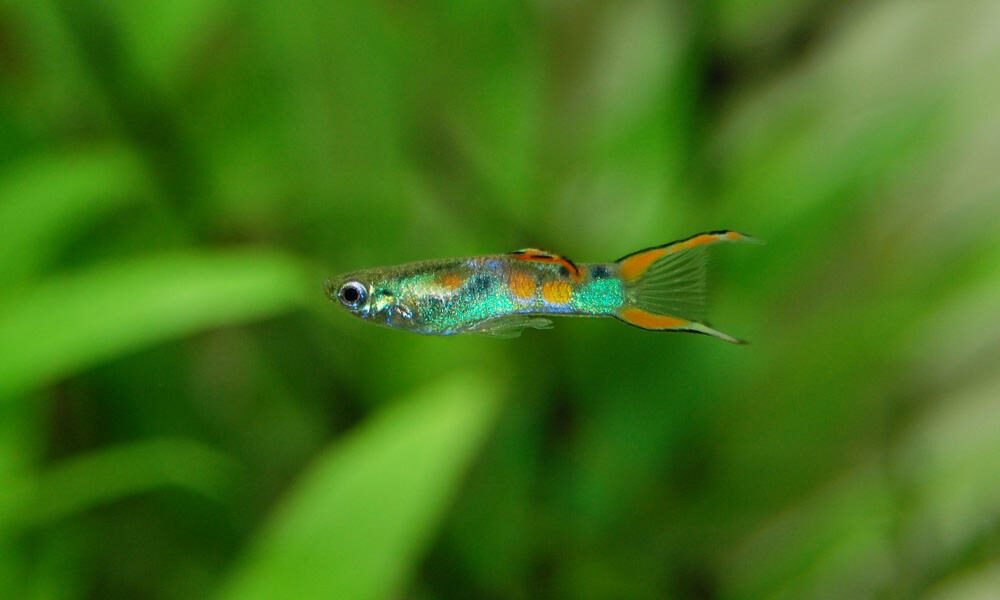
Some of the links on this page are affiliate links. We may earn a small commission on purchases made through them. Our content is not influenced by commissions.
You may have read that guppy fish are not particularly picky eaters. There is no denying that guppy fish seem to eat whatever is on offer. So…
Yes, Guppy fish will and can eat algae. If you have an overgrowing algae problem, introducing guppies to the tank can be a great way to help reduce algae levels.
If you have an aquarium or tank, you will know how fast it can turn green from algae. Although guppy fish only eat a small bit at a time, they will make a difference in how quickly that thin layer of green algae forms on the top of the water or against the glass or the tank, if at all.
What Even Is Algae?
Algae—or alga in the plural—although being green is technically not a plant. It grows like plants but lacks the same structure and growth systems.
‘Algae’ is In fact a term given to a large family of cells that live off light. Like plants, they use photosynthesis to create energy from the sun’s light. As you may know, photosynthesis relies on a chemical called chlorophyll which gives plants and alga their green color.
Algae will grow in your aquarium or tank because of spores. Spores are the airborne particles that algae give off in order for it to spread to other bodies of water. Most, if not all tanks will develop algae naturally.
Although some may like the forest-like green look, it will be harder to observe your fish and other inhabitants of the tank. Not only that but some algaes will deplete the water of nutrients needed by fish and other living things in your tank. Guppies can fix that problem in some cases…
Types of Algae Guppies Like to Eat
There are hundreds of types of alga out there, but there are a few that your guppy will be happier to eat. Make sure to find out what the algae growing in your tank is before you decide on guppies as the solution.
Treating either of these types of algae with hydrogen peroxide will get the guppies nibbling away in no time at all. This is done by adding a few drops of hydrogen peroxide to your tank. Make sure you’re adding the right amount, though.
The algae will absorb the chemical and become delicious to your guppies. So…
- Staghorn Algae – As the name suggests, this algae looks like the horns of a stag growing out from the floor or decorations in the aquarium or tank.
- Black Beard Algae – This type of algae is hard to get rid of. It grows like a fuzzy black beard on the edge of plants in the tank. Without guppies in the tank it will spread and be a nuisance. Guppies will keep Black Beard algae growth under control if you have enough of them.
- Surface Algae – Many different types of surface algae are also eaten by guppies. If you see your guppy picking at the glass or bobbing up to eat algae off the surface of the water do not worry. The algae will not cause any harm to the guppy. In fact, it will keep them entertained for days.
Why Do They Eat Algae?
Guppy babies—commonly known as guppy fry—eat the algae as a source of protein that is small enough for their mouths to get around. For adults however, the algae is eaten more commonly as a byproduct as they search for other foods hiding in the algae.
Guppies may not just eat the algae as a food however. As algae absorbs nutrients and oxygen, it takes it out of the water. Guppy fish rely on oxygen in the water to breath. Therefore, guppy fish may actually be making sure their habitat is suitable rather than eating.
Guppy fish would have evolved this trait in order to keep the water they live in clearer and more advantageous to finding food. If algae gets too overgrown, your guppy fish will struggle to survive. It is important to have some algae for them to nibble on, but not too much as it will hurt them.
Conclusion
Because guppies naturally eat algae, there is no cause for concern. Introducing guppies to your tank may even be an efficient way of keeping the ecosystem self-sustaining.
Research what type of algae you have, and whether guppies are the solution.
link to Can Neon Tetras Eat Betta Food? link to When To Separate A Pregnant Guppy
